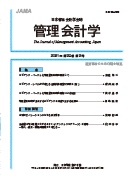Volume 29, Issue 2
Displaying 1-6 of 6 articles from this issue
- |<
- <
- 1
- >
- >|
Invited Articles
-
2021Volume 29Issue 2 Pages 3-11
Published: March 31, 2021
Released on J-STAGE: March 30, 2021
Download PDF (442K) -
2021Volume 29Issue 2 Pages 13-22
Published: March 31, 2021
Released on J-STAGE: March 30, 2021
Download PDF (641K) -
2021Volume 29Issue 2 Pages 23-34
Published: March 31, 2021
Released on J-STAGE: March 30, 2021
Download PDF (361K) -
2021Volume 29Issue 2 Pages 35-48
Published: March 31, 2021
Released on J-STAGE: March 30, 2021
Download PDF (1114K)
Invited Articles
-
2021Volume 29Issue 2 Pages 49-62
Published: March 31, 2021
Released on J-STAGE: March 30, 2021
Download PDF (777K) -
2021Volume 29Issue 2 Pages 63-70
Published: March 31, 2021
Released on J-STAGE: March 30, 2021
Download PDF (344K)
- |<
- <
- 1
- >
- >|
